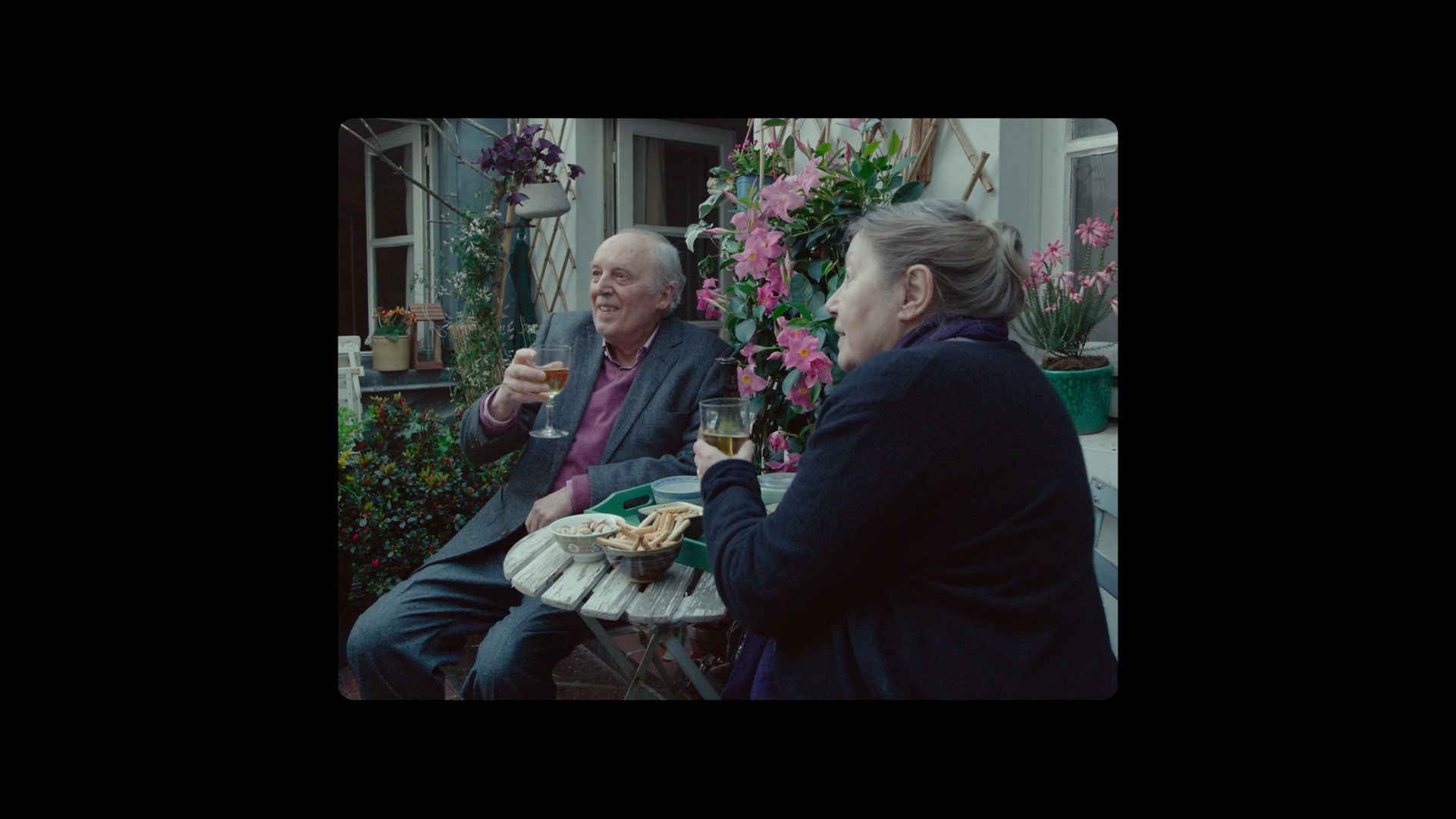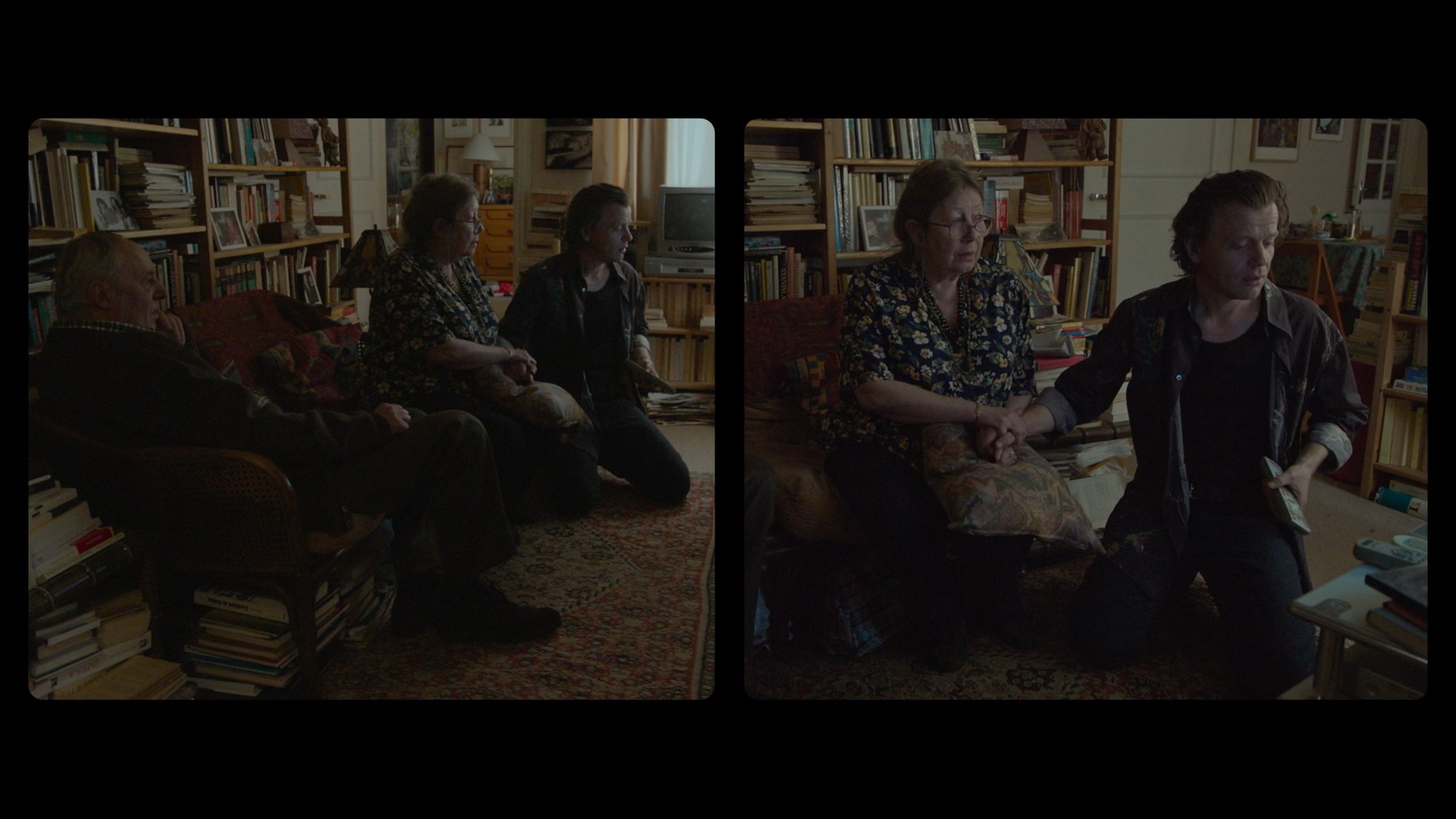

Color, 2021, 148 mins. 10 secs.
Directed by Gaspar Noé
Starring Françoise Lebrun, Dario Argento, Alex Lutz
Utopia (Blu-ray) (US RA HD), Picture House Entertainment (Blu-ray) (UK RB HD) / WS (2.39:1) (16:9)
Not exactly known as  France's most life-affirming filmmaker, Gaspar Noé has
France's most life-affirming filmmaker, Gaspar Noé has  always backed up his harrowing looks at the human condition with more than enough visual daring and storytelling experimentation to qualify his work as much more than simple shock value. His initial claims to fame were audacious endurance tests that became instant cult favorites like I Stand Alone and Irreversible, and since then he's gone on to upend our concepts of everything from POV shots to 3-D. After delivering his most aesthetically aggressive work to date with the not-quite-a-feature Lux Æterna, he continued that film's use of extended split-screen narrative with Vortex, an unflinching examination of what happens when the mind and body start to go in old age. On the surface it might sound like a companion piece to Michael Haneke's award-winning Amour, though the execution is light years away with its fusion of visual presentation and the degeneration of its two lead characters impeccably embodied by the legendary Françoise Lebrun (The Mother and the Whore, The Diving Bell and the Butterfly) and iconic horror director Dario Argento.
always backed up his harrowing looks at the human condition with more than enough visual daring and storytelling experimentation to qualify his work as much more than simple shock value. His initial claims to fame were audacious endurance tests that became instant cult favorites like I Stand Alone and Irreversible, and since then he's gone on to upend our concepts of everything from POV shots to 3-D. After delivering his most aesthetically aggressive work to date with the not-quite-a-feature Lux Æterna, he continued that film's use of extended split-screen narrative with Vortex, an unflinching examination of what happens when the mind and body start to go in old age. On the surface it might sound like a companion piece to Michael Haneke's award-winning Amour, though the execution is light years away with its fusion of visual presentation and the degeneration of its two lead characters impeccably embodied by the legendary Françoise Lebrun (The Mother and the Whore, The Diving Bell and the Butterfly) and iconic horror director Dario Argento.
 Less traditional plot and more character procedural, the film begins with the twilight moments of unity between a nameless wife (Lebrun) and husband (Argento) living in Paris, where they share an apartment they've inhabited
Less traditional plot and more character procedural, the film begins with the twilight moments of unity between a nameless wife (Lebrun) and husband (Argento) living in Paris, where they share an apartment they've inhabited  for most of their adult lives. Their son, Stéphane (Lutz), visits when he can but, due to his own personal commitments, can only do so much at his father's increasing alarm over his wife's dementia and tendency to either go wandering off or committing inadvertent acts of vandalism with their property. The couple has no desire to leave their home where the accumulation of their lives together surrounds them, which becomes a major issue when the husband's own physical state calls into question just how long he can be around as a caregiver.
for most of their adult lives. Their son, Stéphane (Lutz), visits when he can but, due to his own personal commitments, can only do so much at his father's increasing alarm over his wife's dementia and tendency to either go wandering off or committing inadvertent acts of vandalism with their property. The couple has no desire to leave their home where the accumulation of their lives together surrounds them, which becomes a major issue when the husband's own physical state calls into question just how long he can be around as a caregiver.
How much experience the viewer has had with an aging parent, other relative, or friend will probably determine how much this one hits close to home, but Noé treats the material with sensitivity and respect while keeping the material unquestionably his own. Given that this is one of his longest films, there's nothing aesthetically  abrasive here (a la violent strobing) that will make hit a chore to sit through; the harrowing nature of the subject matter and the simple, devastating elegance of the split screen's evolution is more than enough. He also makes
abrasive here (a la violent strobing) that will make hit a chore to sit through; the harrowing nature of the subject matter and the simple, devastating elegance of the split screen's evolution is more than enough. He also makes  some interesting use of unexpected pop culture elements at times, such as an early Scopitone for Françoise Hardy's "Mon amie la rose" (especially powerful given the pop singer's real-life ongoing health devastations) and the sight of Argento kicking back to watch Dreyer's Vampyr on TV.
some interesting use of unexpected pop culture elements at times, such as an early Scopitone for Françoise Hardy's "Mon amie la rose" (especially powerful given the pop singer's real-life ongoing health devastations) and the sight of Argento kicking back to watch Dreyer's Vampyr on TV.
Picked up by Utopia for a fairly generous art house release in 2022, Vortex comes to Blu-ray with a crisp 1080p presentation as flawless as expected for a current title. It isn't a particularly vibrant film, but the subdued color scheme looks great here. In an increasingly common and baffling move that also includes the U.S. release of Lux Æterna, the English subtitles are burned on within the frame (with optional SDH subs added for sound effects and so forth). The main extras here are Q&As with Noé at the New York Film Festival (26m31s), done virtually with Dennis Lim, and IFC Center (22m49s) moderated by Indiewire's Eric Kohn, in which he talks about his use of the split-screen format, the life-threatening experience that inspired the story, his own experiences with his mother's dementia, and the impact of trying to make films during the pandemic. The U.S. trailer is also included, while the package comes with an insert featuring an essay by Heather Drain about the film's place in Noé's body of work and its status among unsparing films about the challenges of aging.
Reviewed on December 4, 2022



 France's most life-affirming filmmaker, Gaspar Noé has
France's most life-affirming filmmaker, Gaspar Noé has  always backed up his harrowing looks at the human condition with more than enough visual daring and storytelling experimentation to qualify his work as much more than simple shock value. His initial claims to fame were audacious endurance tests that became instant cult favorites like I Stand Alone and Irreversible, and since then he's gone on to upend our concepts of everything from POV shots to 3-D. After delivering his most aesthetically aggressive work to date with the not-quite-a-feature Lux Æterna, he continued that film's use of extended split-screen narrative with Vortex, an unflinching examination of what happens when the mind and body start to go in old age. On the surface it might sound like a companion piece to Michael Haneke's award-winning Amour, though the execution is light years away with its fusion of visual presentation and the degeneration of its two lead characters impeccably embodied by the legendary Françoise Lebrun (The Mother and the Whore, The Diving Bell and the Butterfly) and iconic horror director Dario Argento.
always backed up his harrowing looks at the human condition with more than enough visual daring and storytelling experimentation to qualify his work as much more than simple shock value. His initial claims to fame were audacious endurance tests that became instant cult favorites like I Stand Alone and Irreversible, and since then he's gone on to upend our concepts of everything from POV shots to 3-D. After delivering his most aesthetically aggressive work to date with the not-quite-a-feature Lux Æterna, he continued that film's use of extended split-screen narrative with Vortex, an unflinching examination of what happens when the mind and body start to go in old age. On the surface it might sound like a companion piece to Michael Haneke's award-winning Amour, though the execution is light years away with its fusion of visual presentation and the degeneration of its two lead characters impeccably embodied by the legendary Françoise Lebrun (The Mother and the Whore, The Diving Bell and the Butterfly) and iconic horror director Dario Argento.  Less traditional plot and more character procedural, the film begins with the twilight moments of unity between a nameless wife (Lebrun) and husband (Argento) living in Paris, where they share an apartment they've inhabited
Less traditional plot and more character procedural, the film begins with the twilight moments of unity between a nameless wife (Lebrun) and husband (Argento) living in Paris, where they share an apartment they've inhabited  for most of their adult lives. Their son, Stéphane (Lutz), visits when he can but, due to his own personal commitments, can only do so much at his father's increasing alarm over his wife's dementia and tendency to either go wandering off or committing inadvertent acts of vandalism with their property. The couple has no desire to leave their home where the accumulation of their lives together surrounds them, which becomes a major issue when the husband's own physical state calls into question just how long he can be around as a caregiver.
for most of their adult lives. Their son, Stéphane (Lutz), visits when he can but, due to his own personal commitments, can only do so much at his father's increasing alarm over his wife's dementia and tendency to either go wandering off or committing inadvertent acts of vandalism with their property. The couple has no desire to leave their home where the accumulation of their lives together surrounds them, which becomes a major issue when the husband's own physical state calls into question just how long he can be around as a caregiver.  abrasive here (a la violent strobing) that will make hit a chore to sit through; the harrowing nature of the subject matter and the simple, devastating elegance of the split screen's evolution is more than enough. He also makes
abrasive here (a la violent strobing) that will make hit a chore to sit through; the harrowing nature of the subject matter and the simple, devastating elegance of the split screen's evolution is more than enough. He also makes  some interesting use of unexpected pop culture elements at times, such as an early Scopitone for Françoise Hardy's "Mon amie la rose" (especially powerful given the pop singer's real-life ongoing health devastations) and the sight of Argento kicking back to watch Dreyer's Vampyr on TV.
some interesting use of unexpected pop culture elements at times, such as an early Scopitone for Françoise Hardy's "Mon amie la rose" (especially powerful given the pop singer's real-life ongoing health devastations) and the sight of Argento kicking back to watch Dreyer's Vampyr on TV.